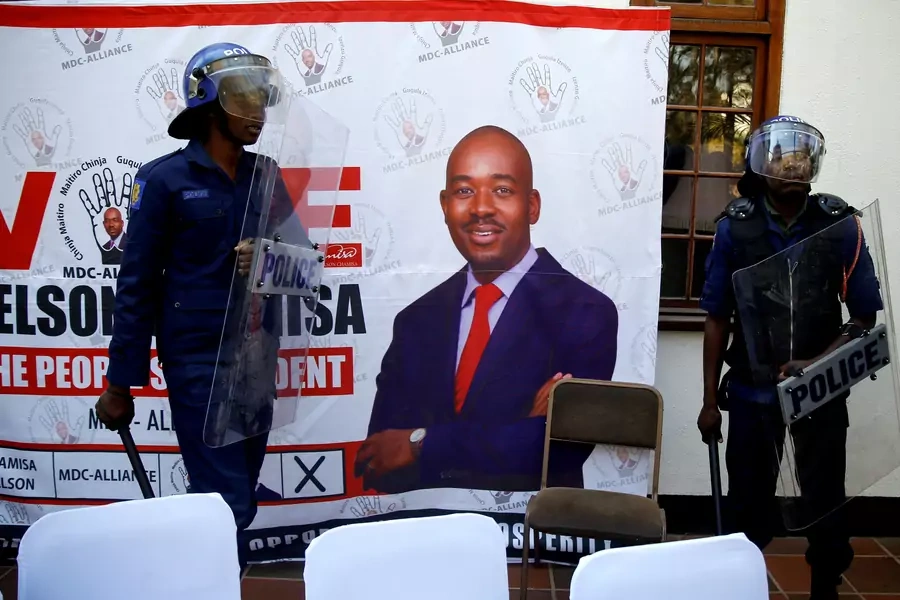The Likely Way Out of Zimbabwe's Election Crisis

The trajectories of the Kenyan elections of 2017 and those just concluded in Zimbabwe have an eerie similarity, and may hint at the future denouement in Zimbabwe. In Kenya, incumbent president Uhuru Kenyatta benefitted from an uneven playing field dominated by his control of state media and the security forces. He ostensibly won the presidency in August 2017, and outside election observers quickly endorsed the outcome. Raila Odinga challenged Kenyatta’s election in the courts, which ordered new elections. They were held in October 2017. Again, Kenyatta was declared the victor after Odinga boycotted the elections. Odinga then, in effect, threatened civil war. The crisis ended with a personal deal between Kenyatta and Odinga, the details of which are not public. Meanwhile, there is anecdotal evidence that Kenya seethes and institutions, such as the judiciary, are undermined.
In Zimbabwe, Mnangagwa benefitted from an uneven playing field, even more so than Kenyatta. He controlled state-owned media and the security services, and benefitted from a long-standing atmosphere of the intimidation of opposition figures. He has been declared the winner, an outcome promptly and shamefully endorsed by African Union observers and those from the Southern African Development Community, but questioned by observers from the European Union, the National Democratic institute and the International Republican Institute, and, most important, the Zimbabwe Election Support Network, a local NGO umbrella that deployed 6,500 observers around the country. The opposition candidate, Nelson Chamisa, claims to have won the election and is challenging the results in the courts with hints that his supporters will take to the streets if necessary. Meanwhile, the Mnangagwa regime is pursuing a campaign of violence and intimidation in opposition strongholds.
More on:
There are broader similarities between Kenya and Zimbabwe as well. Both are potentially rich, with abundant natural resources and fertile soil. Both were colonies of white (mostly British) settlement, and a wealthy white-minority dominated both economies, which were characterized by racism and segregation. The overwhelming black and poor majorities in both countries continue to be deeply divided along ethnic lines, and their respective independence struggles were marked by violence, though it lasted far longer in Zimbabwe. As part of the independence process in Kenya, white farmers were bought-out by the British government, but no such land reform took place in Zimbabwe. Instead, white farmers were driven out by Robert Mugabe almost twenty years after independence. In effect, Mugabe destroyed his country’s economy to preserve his power and enrich his supporters.
In both Kenya and Zimbabwe, new political elites largely appropriated their country’s post-independence wealth, with little trickling down to the mass of the population. In both, there has been little change in leadership since independence; Kenyan politics are dominated by Uhuru Kenyatta and Raila Odinga, the sons of the most prominent independence-era politicians and, among other things, tribal leaders. In Zimbabwe, Robert Mugabe was deposed by a coup orchestrated by Emmerson Mnangagwa, who had been his violent enforcer. In both countries, elections are the occasion for violence.
A way out of the current crisis may be the path followed by Kenyatta and Odinga—a personal deal. There is a history in Zimbabwe of deals between incumbents and opposition leaders following close and dubious elections and hand-wringing by international observers. Notably, Robert Mugabe and opposition leader Morgan Tsvangirai shared power from 2009 to 2013, with Mugabe as president and Tsvangirai as prime minister. In Zimbabwe as in Kenya, politics are highly transactional; it is about personalities and power, not principle. Hence, it is easy to imagine that Mnangagwa and Chamisa could make a personal deal, though what the elements of it might be are at present obscure. The bottom line is that Zimbabwe is in for a bout of violence and intimidation, but at the end of the day there will be a sharing-out of power and wealth by Mnangagwa and Chamisa. Civil war will be avoided, and whatever the settlement is, it will be welcomed and endorsed by foreign governments and businesses. But, there will be little progress in Zimbabwe toward democracy and the rule of law.
More on:
 Online Store
Online Store